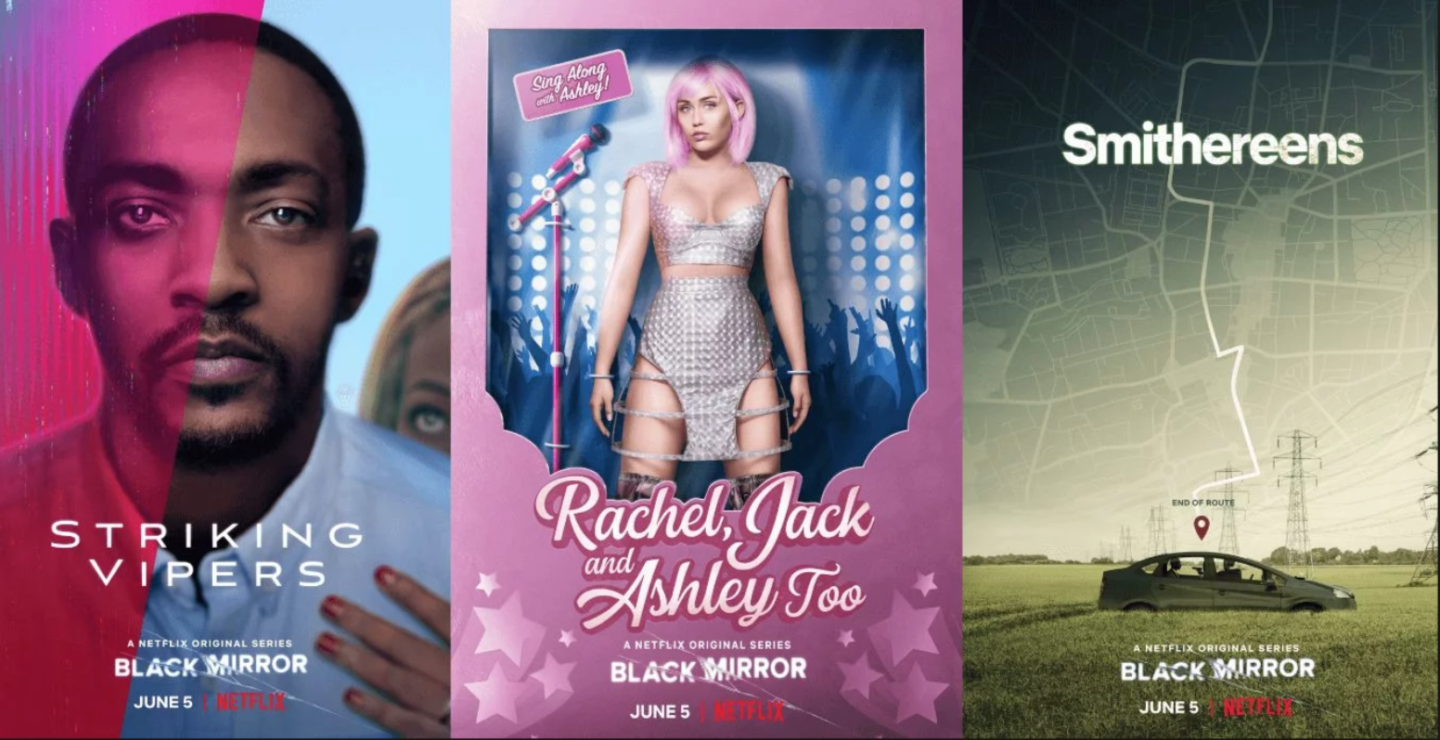Parsed down to just three episodes this season (as it was in the first two series) on the heels of its movie iteration, Bandersnatch, Black Mirror‘s fifth series still has plenty to say–particularly about the ways in which our media addictions have and will continue to fuck us up. For the video game enthusiast, entering “the world” becomes a bit too real, while for the phone-addicted, a California-esque PSA about how one second of lost focus on a task at hand can change everything for the worse.
Opening with “Striking Vipers,” the episode begins with the “innocent” enough all-nighter of video game playing between college friends Danny (Anthony Mackie) and Karl (Yahya Abdul-Mateen II). With both enraptured by the game and the characters they’re playing, Lance (Ludi Lin) and Roxette (Pom Klementieff), respectively, they lose all sense of time until Danny’s girlfriend, Theo (Nicole Beharie), irritatedly interrupts them. Eleven years later, Danny and Karl have grown apart despite living in the same city. Danny has gone the domestic route, while Karl has gone the dating younger women who don’t know who Dennis Rodman is without looking it up route.
The one common ground that still remains is their beloved video game, Striking Vipers X, now upgraded to the point of actually being able to inhabit the specific skin of one’s favorite player. At first, the two keep their exchange limited to fighting, but soon, the tension is broken with a little bit of sex. It doesn’t take long for the two to start scheduling nightly sessions while Theo wonders why her husband has grown so disinterested in touching her, especially since she’s trying to have another baby. It is on the day that Danny forgets his wedding anniversary that Theo calls him out for his detached behavior. Ashamed of what’s happened, of how callously he’s treated her, he tells Karl it’s over–they can’t have their illicit affair in the video game realm any longer. But Karl’s addiction won’t be so easily quelled, and it’s clear Charlie Brooker wants to make it a point from the outset to his viewers that their “harmless” addictions always and usually have a tendency to worsen as time wears on and technology “improves.”
In episode two, entitled “Smithereens,” Chris (Andrew Scott a.k.a. hot priest on Fleabag) reckons with at long last carrying out a sort of revenge for the loss of his fiancée as a result of his social media addiction, specifically to the app, Smithereen. Spending his days parked outside of the corporate office in London, Chris, who works for Hitcher for the sole purpose of carrying out his plot, spots someone he’s sure fits the bill for Smithereen higher-up: a man dressed in a suit. A man, as it turns out, who is a 22-year-old boy that’s a freshly recruited intern. Putting a wrench in Chris’ plan, he tells himself to make the most of it in between berating Jaden (Damson Idris)–as the representation of a generation and all–for not even being able to notice if the sky turned purple thanks to his constant staring into his phone. A situation, Chris further argues, that got him into this hostage scenario in the first place thanks to his lack of awareness. Tensions escalate once Chris is spotted by a police car who happens to catch a glimpse of Jaden struggling in the backseat with a bag over his head (all because of his dainty claustrophobia that wouldn’t permit Chris, in good conscience, to put him in the trunk). But Chris doesn’t care about anything other than getting in touch with Smithereens CEO Billy Bauer (Topher Grace, playing up the CEO tech bro trope to perfection)–he is determined to give him “a bit of user feedback.” Death be damned, ’cause yeah, he’s already dead anyway, like much of the rest of the oblivious app-addicted population.
In the concluding episode, the perfectly cast Miley Cyrus in the role of tween pop idol Ashley O begins to show more than just subtle signs of disillusionment with her cookie cutter pop star image (something Hannah Montana-era Cyrus knows all too much about). A false image that gets eerily replicated as an AI doll at the behest of Catherine (Susan Pourfar), her manager/aunt/all-around puppeteer. While Ashley might detest what’s being presented as the “real” her to her legion of fans, her biggest fan of all, Rachel (Angourie Rice), is elated to receive the doll as a gift for her birthday–even if it gives her shoddy advice about never giving up and how great she’s doing as she practices the Ashley O choreography for “On A Roll” (repurposed from the Nine Inch Nails song, “Head Like A Hole”) for the school’s talent show. Like a mix of Josie and the Pussycats (that whole mind control through pop music element) and a more fucked up teen version of A Star Is Born, “Rachel, Jack and Ashley Too” is a harrowing preview of what the twenty-first century pop star could mutate into if the diabolical profiteers in their orbit had their way (e.g. “fully scalable” hologram performances–now pop stars can never cancel a show due to “illness”!). And as Ashley transforms the lyrics, “Hey there, whoah-ho, I’m on a roll/Riding so high, achieving my goals/I’m so stoked on ambition and verve/I’m gonna get what I deserve” into “Head like a hole/Black as your soul/I’d rather die than give you control/Bow down before the one you serve/You’re going to get what you deserve,” she simultaneously empowers Rachel and Jack (Madison Davenport) to the same heights–ironic, when considering that’s what her frothy pop lyrics were meant to do.
So yes, all in all, Black Mirror remains a staunchly cautionary narrative against our tools of entertainment becoming but tools of destruction, albeit surprisingly much lighter in tone this season. Maybe that’s what happens when the future you warn about becomes your present. You’ve got no choice but to be jocular about it.





















